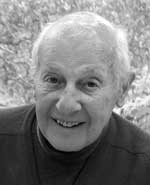Ernst Pulgram, professor emeritus of romance and classical linguistics, died Aug.17 while vacationing in Ireland. He was one month shy of his 90th birthday.

A colleague wrote in a tribute, “With him the last of the great Romanists who had to flee from the Nazis and went to the states, is gone.”
Born Sept. 18, 1915, in Vienna, Austria, Pulgram completed his doctorate in romance philology at the University of Vienna in 1938. Choosing to leave his homeland shortly after its annexation by Nazi Germany, he fled to Switzerland and immigrated to the United States in 1939.
Following two years of military service, Pulgram entered the doctoral program in comparative linguistics at Harvard University, earning a doctorate in 1946. He taught for two years at Union College in Schenectady, NY, and in 1948 came to U-M, where he rose through the ranks and remained until his retirement in 1986.
In 1948, Pulgram and his colleague, Lawrence B. Kiddle, founded what became a flourishing program in romance linguistics. The program granted more than 60 doctorates and many master of arts degrees and a number of Pulgram’s doctoral students went on to become active scholars in the fields of romance and general linguistics.
In 1950, Pulgram and Kiddle co-founded the Language Laboratory, forerunner of today’s Language Resource Center.
In 1979 U-M awarded Pulgram the title of Hayward Keniston Distinguished Professor of Romance and Classical Linguistics. Over the years he held visiting professorships at the universities of Florence, Cologne, Heidelberg, Regensburg, Vienna, Innsbruck, Munich and International Christian University in Tokyo.
Pulgram’s scope of study included proto-Indo-European, Latin, Greek, and romance languages, with an emphasis on French and Italian. He authored five books, several edited volumes and more than 80 articles. Pulgram remained active until the end of his life, publishing book reviews in major linguistics journals.
Always an independent thinker, Pulgram described his intellectual credo: “It never was my desire or my ambition to adhere unquestioningly to any one school of linguistics and to become the disciple or apostle of any prophet … I preferred to practice a brand of linguistics-philology that allowed the problems themselves to determine the means, the theory, if you will, for their solution.”
Early in his career, Pulgram received the Henry Russel Award, and twice held Guggenheim and American Council of Learned Societies fellowships. These, and several sabbaticals, enabled him to spend more than seven years doing research in Italy. In 1990, the University of Vienna awarded him an honorary doctorate, a distinction rarely granted by the institution.
Pulgram was a lover of music and art; he supported the University Musical Society and attended the Salzburg Festival for many years. During his annual trips to Europe he acquired a splendid collection of pre-World War II Austrian art, including the works of Klimt, Schiele and Kokoschka.
Pulgram is survived by his wife, Frances McSparran; brother, William; a niece and three nephews, and their children. A memorial service will be held at 2 p.m. Oct. 29 at the U-M Museum of Art.

